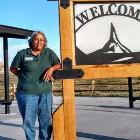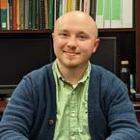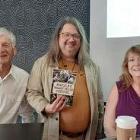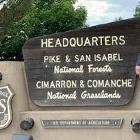From The (Interim) Chair
The History Department saw considerable change and some interesting developments in 2023. We bid adieu (but certainly not goodbye) to our longtime colleague Craig Torbenson, who had taught Geography and Family History for the Department since 1989. We will miss Craig’s even-keeled nature and subtle Harpo Marx impression around the office, as well as his admirable willingness to pitch in and help with any task necessary. Craig and his wife Bonnie have set a wonderful retirement itinerary of travel and family gatherings, and we wish them all the best. At the same time, we are grateful that Dean Hippisley has approved our search for another tenure-track Geographer, and that search will be one of our foci in the coming months.
Speaking of longtime service to the Department, Dr. Jay Price stepped down as Chair after 12 years marked by a welcome calm and collegial vibe throughout the building. Jay will take a much-deserved sabbatical in Spring 2024 – after graciously agreeing to hang out and advise his successor in one of the more taxing jobs on campus.
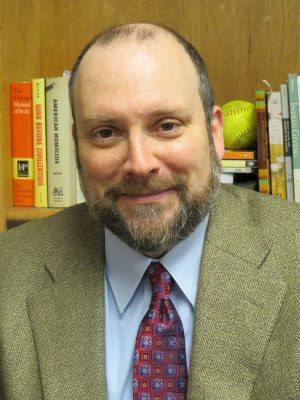
After a series of machinations that my lawyer assures me are “questionable,” but not “actionable,” I agreed to serve as interim Chair for the year 2023-24. {Not really.} I volunteered to step in because the consensus next Chair, George Dehner, is nearing completion of his monograph about Yellow Fever, and he sensibly asked for a bit more time to complete it.
For the last few years our Administrative Specialist, Janice McKown, has performed the herculean task of covering both the Philosophy and History office desks. We are very happy to report that Philosophy is undertaking a search for their own permanent administrator, and we eagerly await seeing Jan back behind the History desk full time by mid-fall of this year. Also, we eagerly welcome back our colleagues, Jeff Hayton and Rannfrid Thelle, from recent sabbaticals, and look forward to seeing them around the office and meeting with students again.
Laila Ballout volunteered to take over as the Graduate Coordinator for the Department, in addition to her work with the International Studies major, for which I am most grateful. (We should also note that you are reading this because Dr. Keith Pickus has generously stepped in to run this very newsletter.)
Our students and alumni continue to impress us and bring honor to WSU and the Department of History. Our own Dr. Jason Herbert (WSU M.A. 2015, Ph.D. Minnesota 2022) has accepted a position with the United States Forest Service as a Tribal Relations Specialist for the Pike-San Isabel National Forests & Cimarron and Comanche National Grasslands. Jason will be working with Tribal Members out there to maintain traditional homelands and help conserve the environment. {Jason’s work as an ethnographer with the Seminole Tribe of Florida makes him, I believe, quite qualified.} Congratulations, Jason.
As always, we thank our alumni for their continuous, gracious, and very necessary support, in all forms. We simply could not do this without you.
Best wishes for the coming year,

ROBERT OWENS
Interim Chair Department of History
Our Students
The intersection of local history and public history can take many forms. They include documentary work, where students such as Derek Landwehr are assisting alum Ken Spurgeon on major film projects while also being the main videographer for other productions such as a film about Mexican American softball. It can involve museum work such as where alum Donna Rae Pearson assists the Kansas State Historical Society in redeveloping the state museum. Other examples include alum Keith Wondra serving as curator at the Boot Hill Museum, alum Logan Daugherty at the Kansas Aviation Museum, and student Suzanne Walenta at the Kansas Oil Museum.
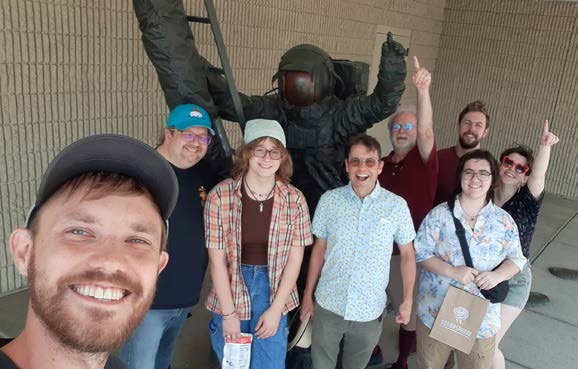
It can involve writing and publication, from alum Seth Bate’s award-winning history of the Walnut Valley Festival to alum Ben Hruska’s blog about Block Island, Rhode Island. Local history is housed in archives and here again, the Local and Community History Program makes its presence felt. Examples include alum Josh Mackey being a significant presence at Oklahoma Baptist University as university archivist, Dee Harris at the National Archives in Kansas City, or student Christen Brouillette working at WSU Special Collections.
There are unique projects that feature WSU alums including Sarah Lavallee’s work with historic photographs at Cornell, Jason Herbert’s work with the Seminole tribe, Sandra Reddish at Chimney Rock in Nebraska, and Kyle Palmer with historic preservation in Arkansas.
A number of students and alumni are now working at various offices at WSU including Carolyn Speer, Kathy Gale, Rhenee Swink, Kaysey Richardson, Erin LeBegue, or Bethany Kennedy. Local history can also involve teaching and we see alums such as Dee Harris, Sadonia Lane, Ken Spurgeon, Luke Chennell, Leigh Jackson, Steven Haynes, Seth Bate, and Mark Strohminger teaching classes at WSU and across the state. Some teach full courses, while others assist in giving talking tours or presenting their research to lifelong learning students.
Students in the program learn early on that “local history is a team sport” and work with alums along with other community members. They are finding that the team lasts throughout their lives and their careers.
Alumni News
GARY BATEMAN ’75 - Since graduating from WSU in 1975 with my BA degree in History, I completed two major careers: First, I served in the U.S. Army as a career Military Intelligence Officer for 20 years with a professional background in the Russian Language and Russian Area Studies, and Cryptology. I later completed a follow-on career as a U.S. Department of Defense Civilian, whereby I specialized in the field of International Security Cooperation while assigned at the U.S. European Command in Stuttgart, Germany, and later at the Defense Intelligence Agency in Washington, DC. I have published two books of poetry: “Conversations with My Muse” (2015) and “Reflections in the Mirror” (2021). Presently I am working on a novella, “A Secret World of Evil,” that I hope to publish later during 2024.
DAMON PENNER BA, ’20 completed his MA in History from Kansas State University, writing a thesis about military government in the Southwest during the Mexican-American war. He currently is enrolled in a Ph.D. program at Kansas State, focusing on guerilla conflicts west of the Mississippi River during the Civil War.
Faculty News
Laila Ballout
Professor Laila Ballout traveled extensively in 2023 conducting research trips for her book project, “Saving Lebanon: Human Rights, Ethnic Politics, and Religion in the Reagan Era.” She traveled to the National Archives II in College Park, Maryland, conducted interviews with Arab American political leaders in Washington, D.C., and researched at the Ronald Reagan Presidential Library in Simi Valley, California.
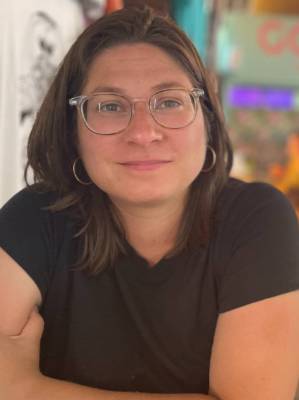
At the Reagan Library she was able to see the results of some Mandatory Review (MDR) requests and Freedom of Information Act (FOIA) requests she placed as a young graduate student in 2012, some of which had only been reviewed and declassified in 2019, and, of course, many remain classified and unreviewed. These long waits are a product of decades of underfunding and understaffing at the National Archives and Record Administration (NARA). She’s very grateful for the heroic efforts archivists who helped her locate some materials and place more requests that might have a chance (with luck and funding!) to be reviewed in time for the next book. She also presented at the inaugural Age of Reagan conference held at the Ronald Reagan Presidential Library in August 2023. The conference was a unique mix of scholars and political figures from the Reagan administration, which prompted some valuable conversations about the history and legacies of the Reagan presidency.
In Fall 2023 she assumed the position of History Graduate Program Coordinator and continues as advisor to the International Studies program. In the classroom she’s excited to be working with both graduate students in the seminar on research methods for graduate students and undergraduates in her U.S. history survey course.
George Dehner
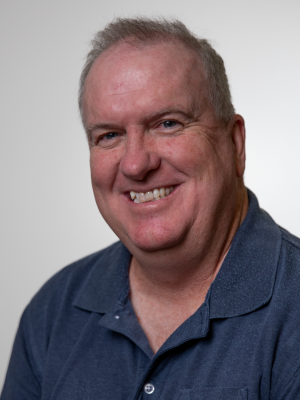
George rang in the New Year by presenting his paper “Unreal Expectations: The CDC and the Legionnaires’ Disease Outbreak” as part of the panel he formed titled “Public Health and the Public” at the American Historical Association’s Annual Conference held this year in Philadelphia.
In addition to his usual course load and service obligations, over the past year George served as a reviewer for three book manuscripts, two federal grant applications, and one journal manuscript.
He also continues his work on his Legionnaires’ Disease manuscript, hopefully to be completed by the summer. He, his wife Jodi, their three boys (Brendan, Patrick, and the newest Shocker, Sean) and their dog, Trooper, have enjoyed another year here in Wichita.
John Dreifort
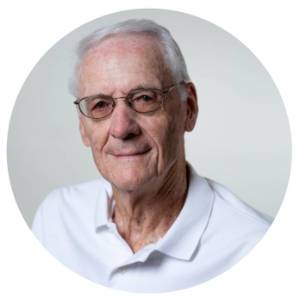
Modern Europeanist John Dreifort continued to teach his full array of modern European history each semester, as well as the occasional course in the History of Baseball.
Additionally, he taught courses in the adult education program to over 100 senior citizens in Community Education each semester. They prove to be a most interesting and challenging group, with wide-ranging interests and experiences that they bring to discussions of historical and contemporary issues.
He continues to make slow progress on a variety of research projects, most notably on his book on the World War II relationship of General’s Eisenhower and de Gaulle.
He continues to engage in a wide range of community activities, including the Wichita Committee on Foreign Relations, which he continues to serve as its executive director and on the executive board of its national organization. He enjoys hearing from his many former students and revels in their successes.
Jeff Hayton
Last year was an exceptional year for Jeff Hayton. In the first instance, his long-awaited book on punk in divided Germany finally saw the light of day. “Culture from the Slums: Punk Rock in East and West Germany” was published by Oxford University Press in May 2022, and has now sold out its first print run, and is about to be released as a less expensive paperback. The book was a heavily-revised version of his Ph.D. dissertation, and although it took longer than anticipated to appear (thanks, pandemic), he is very pleased with the final product. Now, with this book out of the way, he can move on to less sonically-abrasive subject matter to the ever-lasting appreciation of his wife and dog.
Besides his monograph, he also had several articles appear. The first was a book chapter about the relationship between punk and the Krautrock genre in a volume edited by a collaborator, Uwe Schütte. Jeff was lucky to be in Berlin when the book appeared because there was an event to celebrate its release (only in Germany are there events when academic books are published!) which included Wolfgang Seidel, the original drummer of Ton Steine Scherben, a cult band from West Berlin in the 1970s and one of the very first to sing in German (most German rock bands sang in English at the time). Additionally, an article exploring punk emotions in East Germany appeared in the Canadian Slavonic Papers journal and it just won the best article of the year award for 2022 from the Canadian Association of Slavists.
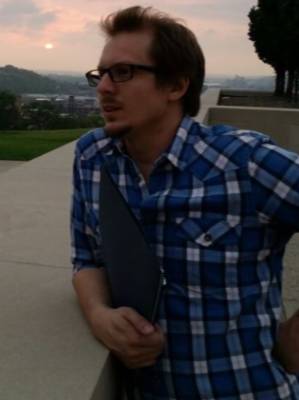
Right now, he is working on four new articles which are all due in the next year – hopefully he finds the time to get them all done!
The big news was that Jeff was on sabbatical last year and he was fortunate enough to spend it in Germany. He is now writing several books on the history of mountains in Central Europe. The first is called “Socialist Summits: Mountaineering in the German Democratic Republic,” which explores the culture of climbing in East Germany. Although there weren’t many mountains in the former East Germany (the highest was the Fichtelberg at 1215 m), climbing captured the East German imagination. There was a national climbing and hiking organization, and a national alpine team which was created to summit peaks around the world. East German teams undertook expeditions to the Alps, South America, Africa and Asia. Communist officials believed these successes would bolster the reputation of the state on the global stage, while climbers saw them as opportunities to travel abroad. At the same time, Western climbers traveled to East Germany to climb in a rocky region southeast of Dresden near the Czech border called the Sächsische Schweiz (Saxon Switzerland) which boast towering sandstone rock pillars that Saxon climbers had been scaling barefoot and often without rope since the 19th century.
In this history, Jeff hopes to write the first study of this culture and to use climbing to explore the relationships between state socialism and the natural environment. You can read more about Jeff’s sabbatical in Germany further down the page.
This year, Jeff is looking forward to finishing up several projects including an edited volume on East Germany under Honecker and getting back into the classroom and working with students.
Robin Henry
During the 2022-23 academic year, Dr. Henry took on a new role by becoming the interim chair of the Department of Women’s, Ethnicity, and Intersectional Studies (WEIS). Formerly Women’s Studies, this new department includes several cross-listed history courses and makes an easy LAS double major. In 2023, Dr. Henry transitioned into the permanent chair, a position she will hold for three years.
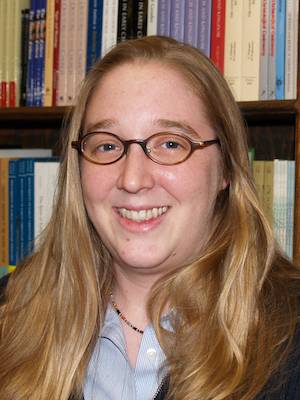
After several years of not traveling, Dr. Henry presented at the National Women’s Studies Association annual conference in 2022 and has had another paper accepted at NWSA for 2023. In addition, she delivered the annual Rothbaum Lecture in Constitutional History at East Central University in Ada, Oklahoma, in fall 2022. Finally, she was able to travel to New York and Pennsylvania to use several collections on the Henry Ford Peace Mission of 1917.
From her research she had two articles accepted, “Benjamin Barr Lindsey and the Public Debate over Youth Sexuality,” in the Journal of the History of Sexuality and “I didn’t realize there would be so much cleaning: How restructuring a women’s studies department put the sex back into my work” in DiGeSt: Journal of Diversity and Gender Studies. She is currently working on another journal article, “Years of the Living Dead: Zombie Laws, Legal Dormancy, and the Contingent Rights of Sexual Minorities,” for Law and History Review, as well as a book-length manuscript on Benjamin Barr Lindsey. She continues to be an active member of her online writing group and is busy planning a writing retreat with several colleagues at other institutions who also explore questions of gender, sexuality, and power.
Helen Hundley
Center of Buddhism in the Russian Empire
Russia’s invasion of Ukraine has vividly illustrated the value of the knowledge of history. From the history of medieval Russia to the identification of Ukrainian as a separate language in the nineteenth century all have been shaken by the war. Textbooks in Russia this fall have removed the word Kiev.
Scholars who study the region have been effectively limited by the war. However, conferences bringing scholars from around the world together continue to meet. Scholars continue to plumb their, and my, wealth of materials gathered prior to the war.
Robert Owens

Dr. Robert M. Owens served as the interim Graduate Coordinator for 2022- 23, and then agreed to serve as the interim Department Chair for 2023-24.
In anticipation of the latter move, he engaged in a flurry of research trips for an upcoming project about how early Americans treated friends and enemies in death. This involved lots of visits, camera in hand, to historic battle sites and cemeteries, from the Florida panhandle (twice this year) to Tennessee, Pittsburgh, Philadelphia, Boston, upstate New York, Ontario, Canada and northwestern Ohio.
Owens enjoyed teaching his courses this past year, in particular fine classes in Historiography and the American Revolution.
His latest book, “Killing Over Land: Death and Diplomacy on the Early American Frontier,” will be published by University of Oklahoma Press in early 2024.
Rannfrid Lasine Thelle
Rannfrid I. Lasine Thelle directs the Religion Program, housed here in the History Department. Last fall, students in the course “The Bible and the Ancient Near East” presented their final papers at a successful event held in the RSC, with fellow students, friends and family members in attendance. The students had presented and critiqued one another ahead of time and were well prepared to engage with the attendees, thus gaining valuable real-life experience.
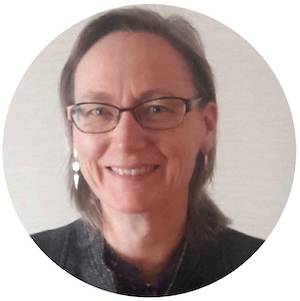
Rannfrid Lasine Thelle
Rannfrid enjoyed a sabbatical in the Spring of 2023, continuing to work on the book “Babel and Bible.” This project analyzes the many ways in which the “discovery” of Mesopotamian cultures in the nineteenth century impacted the field of biblical studies. In addition to this on-going research project, Rannfrid saw two book chapters published in the past year: “Moab as a Mirror for Judah,” an essay on the relationship between the two tribes of Moab and Israel, explored through biblical narrative and poetic traditions, and “Motherhood, Violence, and Power in the book of Judges,” an intertextual and gender-focused study of the motif of motherhood.
In the fall of 2022, the Religion Program continued the newly inaugurated speaker series and hosted Dr. Rachel Schwaller of the University of Kansas. She gave a talk entitled “Godly Reading Before Breakfast: Evangelical Magazines in the Shaping of American Life.” Earlier the same day, Rachel participated in a roundtable/panel discussion hosted by the Religion Program on the topic: “Before Fairmount College: the ‘prehistory’ of college campuses and why it matters.” Several faculty members and students from across campus and the wider community participated in an engaging and important discussion.
Jay Price
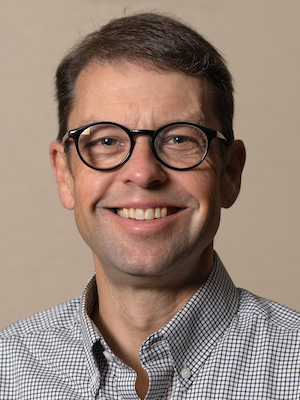
Having concluded his time as chair, Jay Price is turning his attention back to teaching and to several projects including a Spanish translation of the Luke the Longhorn graphic novel series, a photo history of the Wichita LBGTQ community, and continued work on the study of ethnic entrepreneurs.
He is also preparing for his sabbatical where his main project will involve a study of the career and legacy of Governor John Carlin.
Keith Pickus
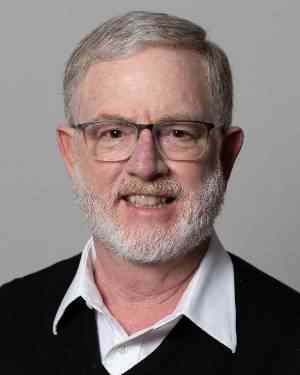
Keith Pickus continues to teach courses for both the History Department and the Cohen Honors College. Last fall, he taught a completely revamped version of his Holocaust History course that he last taught more than 15 years ago. Central to this process was making use of available video footage and survivor testimonies, both of which greatly enhance students’ ability to engage with the material. In spring his efforts focused on revising the Genocide History class he first taught a year ago to help students process the wide range of historical information associated with the topic.
Outside of the classroom Professor Pickus wrote a yet-to-be-published essay on “The Arc of a University Career” and coordinated a series of informal conversations with Honors College faculty to help assess how faculty differentiate their teaching of honors courses from regular departmental offerings. In addition, Keith is an active board member on two organizations within the Wichita Jewish community.
Robert Weems
Most of Professor Weems’s activities during 2022-23 were a continuation of previous endeavors. For instance, as the principal investigator (PI) for the grant-funded project “Wichita Nonwhite Business People Tell Their Stories,” he, along with the project co-PIs (Drs. Sue Abdinnour and Jay Price) coordinated the ongoing interviewing of local African American, Asian American and Hispanic entrepreneurs. In addition, Weems, Abdinnour and Price developed an article linked with an earlier survey they conducted among Wichita African American, Asian American and Hispanic businesspeople.
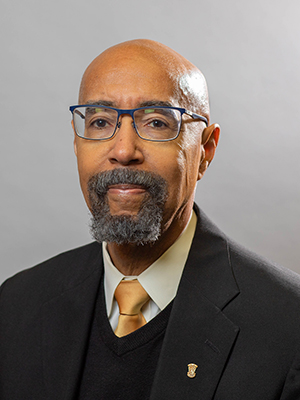
An important new activity that Professor Weems engaged in during 2022-23 was an October 28, 2022 keynote presentation related to the Bicentennial of the founding of the African nation of Liberia in 1822. This event was sponsored by U.S. members of Liberia’s Grand Bassa County Association and Indian River State College in Fort Pierce, Florida. Nearly fifty years ago (in 1974), Weems, then an M.A. student at Boston University, conducted an oral history of the labor movement in Liberia. Consequently, his 2022 presentation could draw on some first-hand observations regarding Liberia’s historical evolution.
The major highlight of Professor Weems’s activities during 2022-23 was his February 25, 2023 induction into the Kansas Black Educators Hall of Fame (sponsored by the Art That Touches Your Heart Foundation). This was a truly special moment for Weems in that it recognized the totality of his career as a professor (University of Iowa, University of Missouri-Columbia, Wichita State University).
Last, but not least, in spring 2023, Professor Weems participated in a couple of events linked with the United Nations’ Working Group of Experts on People of African Descent (WGEPAD). First, he was an invited participant in an April 30 virtual session featuring the hypothetical construct, “Reparations Achieved! Now What!” Weems and other roundtable participants discussed financial instruments and mechanisms that could sustain generational wealth for people of African descent.
In a parallel activity, Professor Weems submitted a working paper entitled “African American Insurance Companies: A Case Study of Economic Triumph and Economic Tragedy” to the U.N.’s Working Group of Experts on People of African Descent. This working paper (and others) were part of the WGEPAD report submitted to the 54th session of the United Nations Human Rights Council and to the 78th session of the United Nations General Assembly.
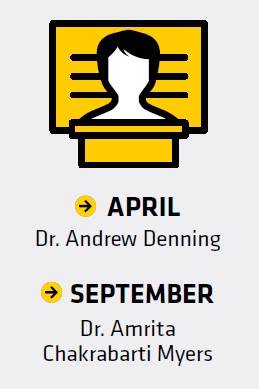
History Department Lecture Series
The History Department Lecture Series welcomed two wonderful presentations in 2023.
In April, Dr. Andrew Denning, Associate Professor of History at the University of Kansas, spoke about “Automotive Empire: How Cars and Roads Fueled European Colonialism in Africa.”
In September, the history department partnered with the Department of Women’s, Ethnicity, and Intersectional Studies for their Words By Women lecture series and welcomed Dr. Amrita Chakrabarti Myers, Associate Professor of History and Gender Studies at Indiana University, Bloomington, to speak on her forthcoming book “The Vice President’s Black Wife: The Untold Life of Julia Chinn.”
A Trek Through Germany
Jeff Hayton
Jeff Hayton spent his sabbatical conducting interviews and archival research around Germany for his new monograph on Socialist Summits: “Mountaineering in the German Democratic Republic.” While he enjoyed his time in them all (except Chemnitz, where he got Covid), the best place he worked was in Dresden where he was able to enjoy something historians often dream about, but rarely experience.
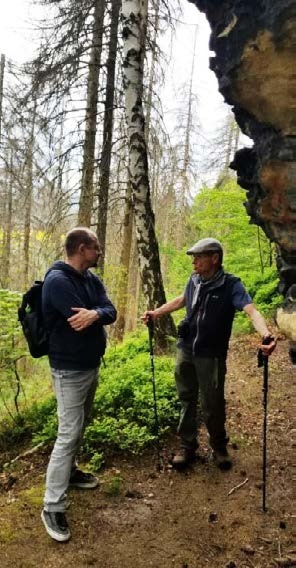
In Dresden is the Saxon Alpine Club (Sächsische Bergsteigerbund), one of the oldest mountaineering clubs in Germany. It recently opened a new building featuring a state-of-the-art climbing wall, gym, library and café. It also houses the archive of the club, a room piled high with old diaries, tour books, periodicals, flyers, photographs, stacks of letters and old bits of gear. But there is no order, no record system, not even a list of materials: the volunteers who ‘manage’ it don’t even know what is in there. Somehow, Jeff sweet-talked his way into that room, and they even gave him a key so he could go in and out on his own. For months, he spent his days systematically going through that room, copying materials which no one has ever seen, or even knows exists anymore.
Probably his best discovery was a 13-volume history of the SBB typed on crumbling GDR-era onion-skin paper by a man named Fritz Petzold, the chairman of one of the underground climbing clubs which continued to function under the communists: 3000 pages of idiosyncratic reminisces about club and climbing. Jeff also had the privilege of meeting several old climbers from the former GDR including the legendary Bernd Arnold who, in the 1970s, was probably the best climber in the world, even if very few ever heard of him. Now that he is back in Kansas, he must organize all the materials he collected so he can start writing; it is going to be a busy year.
A Sabbatical of Research and Writing
Rannfrid Lasine Thelle
For me, being on sabbatical this past semester meant having control over my time, sitting in the comfy winter study I had prepared at home, and having the opportunity to devote that time to work without interruption on a book project: “Babel and Bible: The Impact of Mesopotamia on Biblical Studies 1872–1924.” This is a history of research project in my field of Old Testament/Hebrew Bible.
The last quarter of the nineteenth century was a seminal period in many of the humanities and social sciences. Major breakthroughs took place in historical consciousness and the study of the ancient past that also impacted traditional approaches to the Bible. At the same time, excavations of buried Mesopotamian cities had revealed material culture remains and tens of thousands of texts from ancient cultures that until then had only been known through biblical and Greek sources. The excavations revealed a rich and vibrant culture that had lasted for over 2500 years, that had its own script system (cuneiform) and language, political and religious history, education, arts, architecture and had dominated the entire region.
The new field of Assyriology, as it was called, interfaced with biblical studies, and gave it a new context. Other fledgling fields such as archaeology, anthropology, and folklore studies contributed to this rich period within intellectual history. I’ve had the temptation to go down many rabbit holes during this work, and wished many times that I could just keep going where my curiosity took me. But that doesn’t lead to any end product. The sabbatical enabled me to push through in the difficult phase of producing a book manuscript, and I now have a rough draft to continue tinkering with, when time allows. Never mind that I was supposed to be working on the next book; that will have to be for the next sabbatical.
A Final Publication
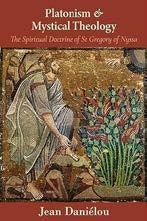
Former History Professor Dr. Anthony Gythiel, who passed away in May 2014, had his 18th and final book published last year. His translation of Platonism and Mystical Theology was dedicated to Dr. Gythiel and marks a fitting culmination for his scholarship that focused on the writings of the early church fathers. Dr. Gythiel’s faith, historical training, and familiarity with 13 languages made him uniquely suited for the difficult work of translating theological-historical works about Eastern Christianity.
Fall 2023 Scholarships
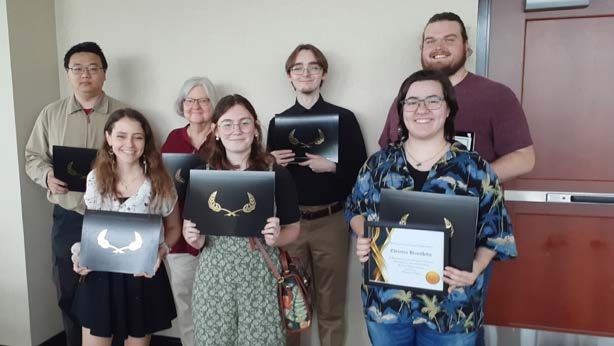
Bottom Row: Cassity Sutton, Allison Waldt, Christine Brouillette
Top Row: Bowen Hou, Sandra Hain, Niklas Erwin, Justin Gordon
In 2022-23, thanks to the generous support of the department’s donors, nearly $19,000 was delivered to graduate and undergraduate students in the form of scholarships, awards and research support. In the category of undergraduate paper awards, Niklas Erwin’s submission, “The Influence of Anglo-Saxon Legal Culture,” was picked as the best paper in History 300 and therefore receives the Douglas Bendell Award in Research and Writing. Graduate students competed for two paper awards with Bowen Hou’s “An Unwelcome Decision” tapped for the Fiske Hall Seminar Award and Christen Brouillette’s “The Fall of Midwifery” garnering the Fiske Hall Non- Seminar Award. Justin Gordon’s entry, “This Display of Manhood,” was selected for the PAT Kind Shepherd prize.
The department presented a number of undergraduate awards this year. Cassity Sutton was identified as the superior sophomore history major and was rewarded with the Lee and Helen Kamen Scholarship. Claire Kelly, continuing her run of departmental recognition, was selected for the Bill and Donna Ard Endowed Scholarship, and Andrew Suriano netted the John Edward “Jed” Hurley Jr., award. Ephraim Morris was chosen for the Dr. Henry and Minnie Onsgard Scholarship, and Allison Waldt was slotted for the Suellentrop Family prize. Grace Bowman received the nod for the Decker-Kansas Society of DAR Award and Maia DeLong was identified as the winner of the Russell “Jiggs” Nelson Scholarship. Seth Wiesner was honored with the Marie Graham Memorial Scholarship and Justin Highbarger collected the Gardner Award for the spring of 2023.
Graduate students are eligible for scholarships and fellowships, as well as awards to support their schooling and their research. Eric Blonigen received the Anthony and Dana Gythiel Endowed Scholarship, and Sandra Hain was recognized as the superior graduate student with the John Rydjord Award. Justin Gordon was selected for the Miner/Unrau Graduate Research Award in fall of 2022, and the William and Ruth Heaston PAT, Gamma Rho Chapter Student Support Fellowship in the spring of 2023. Preston Peer was the recipient of this student support fellowship in the fall of 2022.
Speaking on behalf of the department, I want to extend my thanks to our generous benefactors and offer my congratulations to all our student winners.


